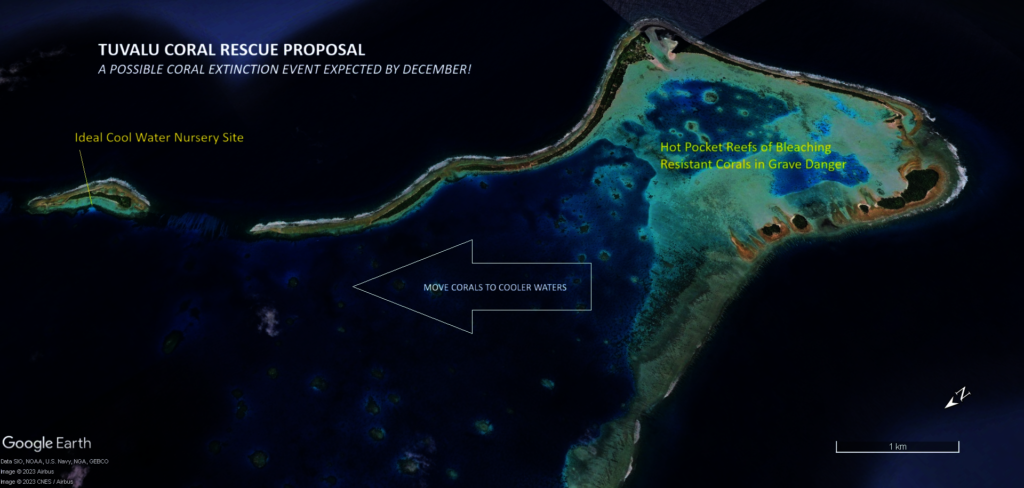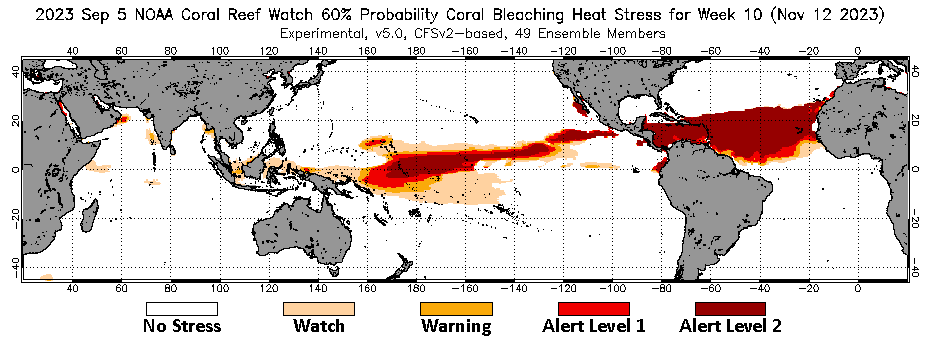By Austin Bowden-Kerby | Corals Researcher and lead marine scientist
The world became aware of the climate change plight of the Pacific island nation of Tuvalu when their foreign affairs Minister Simon Kofe gave a statement to the International Climate UN Conference Cop26 in November of 2021 while standing knee-deep in Fongafale shallows. This visual of how Global Warming causes sea levels to rise helped wake up the world to how immediate the threat is to low-lying island nations. These shallows are part of the whole hot pocket bay system which is home to many varieties of potentially heat-resistant coral.

Tuvalu’s foreign affairs Simon Kofe gives a Cop26 statement while standing in the ocean at the far end of Fongafale, the main islet of the capital Funafuti, Tuvalu. Photograph: Courtesy Tuvalu's Ministry of Justice, Communication and Foregin Affairs/ Socia Media REUTERS
Fiji's Corals for Conservation Mobilizes to Assist and Document by Film the Tuvalu Reef Rescue Project:
Tuvalu's reefs are the most pristine coral reefs in the entire Pacific. Tuvalu, already impacted by ice melt causing the sea level to rise, now has its fisheries and pristine reef system threatened by a predicted drastic rise in sea temperatures. Most sea life will be stressed, and especially the coral will likely be bleached to some degree. Fiji's Corals for Conservation is poised to share their strategy and expertise of identifying more heat-resistant corals and then moving them to cooler outer waters. This is admittedly an emergency tactic designed to save coral genotypes for hopefully up to three decades, but at the same time the world has to turn around Global Warming and arrest pollution sources from contaminating the ocean. Alarmingly, NOAA predictions show an extreme bleaching heat wave arriving in December. It is imperative the diversity of this unique reef is spared.
The Tuvalu Reef Rescue Plan: Why the Urgency
In my opinion, when the tipping-point scale change in mean ocean temperatures began last July, https://climatereanalyzer.org/clim/sst_daily/ the era of coral restoration is largely over, and the era of rescuing coral genotypes and preventing coral species extinction has arrived. Just like we stop planting trees and carrying out reforestation during severe droughts and in periods of extreme fire threat, changing strategies to build firebreaks and create seed banks and gene banks and secure reproductive populations, we must now change strategies with coral reefs. I discuss this in my recent paper. https://www.mdpi.com/2673-1924/4/1/2/pdf
Only one island nation in our region has escaped these many level 1 and 2 bleaching events, and that is Tuvalu. With the most amazing branching Acropora coral populations remaining (that I know of at least) found on Funafuti, the main Atoll. This includes km after km of diverse 3-meter high staghorn thickets, huge 3-5 meter wide single colonies of Acropora florida and A. grandis, and other thick branched coral species (which in other areas are under 1m wide). Heat adapted populations of these corals are located in warm shallow lagoons. There are also very large colonies of erect plate-like and knobby Heliopora, the blue corals, and very large tabulate, digitate, and corymbose species. Tuvalu has perhaps the most intact example of an Acropora climax community. Located on the fringe of cyclone activity, Tuvalu receives the cooling effects of cyclones without the damage, and this structures the resulting community. Massive coral species, for example, are not as common, having been overtaken by the faster growing Acroporids. As the Atoll has clean oceanic waters, COTS (Crown-of-Thorns Starfish) are exceptionally rare.
But sadly, after many lifetimes of stability, these reefs may be in their last few weeks of life. The massive heat wave now in Kiribati is heading their way, with severe condition 2 bleaching predicted to hit by December. This is particularly sad as these reefs have not been well studied!
We are planning an intervention for Tuvalu, in partnership with a local NGO and Fisheries. The shallow south Funafala lagoon has the most interesting and largest coral colonies in <2m of water, which already experience uncomfortable temperatures in summer, and with almost no coral bleaching or mortality recorded. We are operating on the assumption that these hot pocket reefs could reach temperature extremes of >36C in the coming months, potentially 38C, like we saw for nearshore Florida waters in recent months. So we plan to sample as much of this biodiversity as possible, and to move it out to a much cooler nursery site, in a well-sheltered sandy area, located behind a small island situated between two deep reef passes on the windward side of the atoll. We are raising funds for this emergency effort, and we also plan to film the coral rescue for presentation at COP28, in partnership with the Coral Restoration Consortium group. After Tuvalu is secure, then we will move to Vanuatu and Fiji with these same strategies.
I am mobilizing action in Tuvalu, and will fly there in November with my filming expert, so I can help our local partner organization, Fuligafou, a youth-based NGO dedicated to the environment. Relocating genotypes to protective cooler waters needs to happen before the heat wave hits. Hot pocket coral samples will be moved from the Funafala lagoon in Funafuti Atoll's south, the largest hot pocket in the nation.
These are the updated predictions: Kiribati is the country that gets hot first, the islands on the equator, that same chain a bit further south is Tuvalu. Fiji and Samoa are right below the hot blob. It is clear that this hot blob is water that has been heated up by Mexico and then moved west. Australia in January begins to heat up on its own from hot summer conditions. If this hot blob moves over us it will be cooking hot. I am not sure that NOAA has this right--they say this is 60% probability, but it might be an under estimation due to the heat spike, which they never have had in their models. Tuvalu is for sure the focus from now till Christmas.
Your financial partnership with the emergency coral response to pending coral bleaching is indispensable. You give us not only funds, but the faith to continue this difficult rescue work.
Sincere thanks, Austin
Project reports on GlobalGiving are posted directly to globalgiving.org by Project Leaders as they are completed, generally every 3-4 months. To protect the integrity of these documents, GlobalGiving does not alter them; therefore you may find some language or formatting issues.
If you donate to this project or have donated to this project, you can receive an email when this project posts a report. You can also subscribe for reports without donating.
Support this important cause by creating a personalized fundraising page.
Start a Fundraiser
